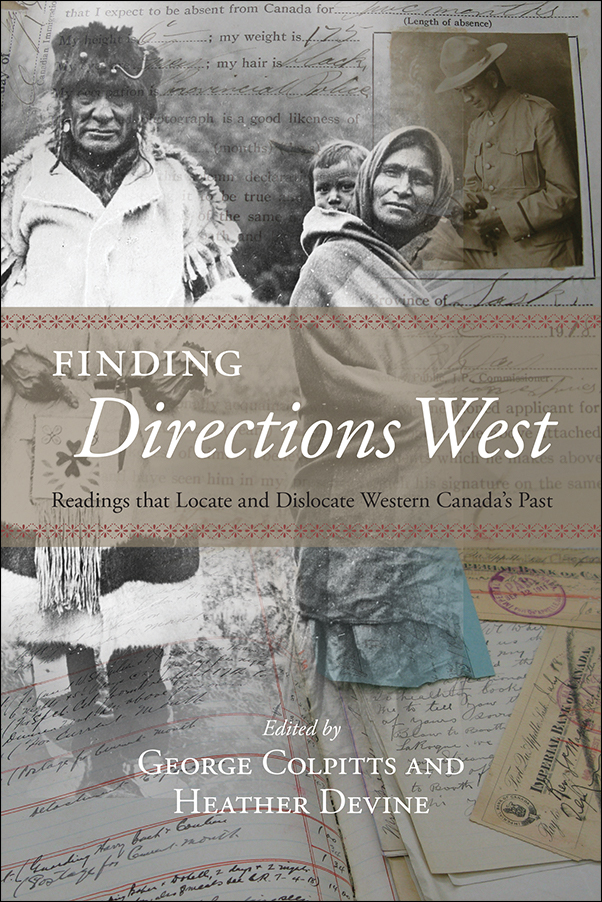
Finding Directions West: Readings that Locate and Dislocate Western Canada's Past
Edited by George Colpitts and Heather Devine
$34.95 CAD / $34.95 USD (S)
330 pages, 24 illustrations
6 x 9 inches
Paperback: 978-1-55238-880-8
Epub: 978-1-55238-883-9
Library PDF: 978-1-55238-882-2
February 2017
Western Canada is a place of new direction in human thought and action, migration of the mind and body, and of personal journeys.
Finding Directions West explores the ways that Western Canada has served as a space of constant movement between places of spiritual, subsistence, and aesthetic importance. Showcasing new research, this volume brings together studies that approach community building, placemaking, and the self-creation of meaning from many different perspectives.
From the representation of Indigenous people in museum displays to the efforts of LGBTQ+ people to discover themselves within the historical record, from the way Métis communities have turned to grassroots narratives as a means of cultural preservation to the efforts of early Alberta suffrage activists to define themselves within the public eye, this anthology is a fascinating overview of new directions in Canadian historiography.
Too often, history is understood as fixed, precisely mapped and authoritatively documented. Finding Directions West challenges readers to think differently about the history of Western Canada, a region where people, places, and ideas are in constant, energetic flux, and where those who have come before leave a significant legacy for the present day.
With Contributions By: Kimberly Mair, Cheryl Avery, Shelley Sweeney, Will Pratt, Mallory Allyson Richard, Sarah Carter, Sterling Evans, Max Foran, PearlAnn Reichwein, and Karen Wall
George Colpitts is a professor in the Department of History at the University of Calgary. He has published five books, as well as contributing numerous chapters and journal articles to academic publications. Colpitts is the winner of both the American Society for Ethnohistory’s 2012 Robert F. Heizer Prize and the 2010 Frederick C. Luebke Award for outstanding regional scholarship.
Heather Devine is an associate professor in the Department of History at the University of Calgary. Her publications, research, and teaching specialties focus on Canadian Native History, Museum and Heritage Studies, and Western Canadian ethnic history, with a particular focus on Métis ethnohistory. She is author of The People Who Own Themselves: Aboriginal Ethnogenesis in a Canadian Family, 1660–1900, winner of the Harold Adams Innis Prize for 2004–2005.
Illustration
Acknowledgements
Introduction: Migration and Transformation in the Canadian West
George Colpitts and Heather Divine
Spatial Deployments to Synchronic Witnessing: Reiterations of Contact in Museum Space
Kimberly Mair
Discombobulated Remnants?: Preserving LGBTTTIQ Histories
Cheryl Avery and Shelly Sweeney
J.Z. LaRocque: A Métis Historian’s Account of His Family’s Experience During the North-West Rebellion of 1884
Heather Devine
Colonizer or Compatriot?: A Reassessment of the Reverent John McDougall
Will Pratt
Exploring the “Thirteenth” Reason for Suffrage: Enfranchising “Mothers of the British Race” on the Canadian Prairies
Mallory Allyson Richard
“Develop a Great Imperial Race”: Emmeline Pankhurst, Emily Murphy and Their Promotion of “Race Betterment” in Western Canada in the 1920s
Sarah Carter
“The Country Was Looking Wonderful”: Insights on 1930s Alberta from the Travel Diary of Mary Beatrice Rundle
Sterling Evans
A Blueprint for Range Management: The Anderson Grazing Rites Report of 1941
Max Foran
Mountain Capitalists, Space, and Modernity at the Banff School of Fine Arts
PearlAnn Reichwein and Karen Wall
Bibliography
Contributors
Index
[The] editors preface the volume with a brilliant, even inspired, reflection on the diversity and mutability of perceptions of the region while highlighting a central theme that binds the anthology into a coherent whole . . . Together, these articles provide an effective overview of new directions in the historiography of Western Canada and, more generally, in the historiography of regions. By elucidating the theoretical and methodological diversity of the field, Finding Directions West serves as a valuable resource for a broad spectrum of academic and public historians.
—Timothy P. Foran, Canadian Journal of History
Self-reflexive and thought-provoking . . . particularly timely, as history departments grapple with the challenges of sustaining undergraduate enrolment and better-preparing graduates for roles outside academia.
—Krista Barclay, The Canadian Historical Review
1. Spatial Deployments to Synchronic Witnessing: Reiterations of Contact in Museum Spaces
4. Colonizer or Compatriot?: A Reassessment of the Reverend John McDougall
8. A Blueprint for Range Management: The Anderson Grazing Rates Report of 1941
9. Mountain Capitalists, Space, and Modernity at the Banff School of Fine Arts